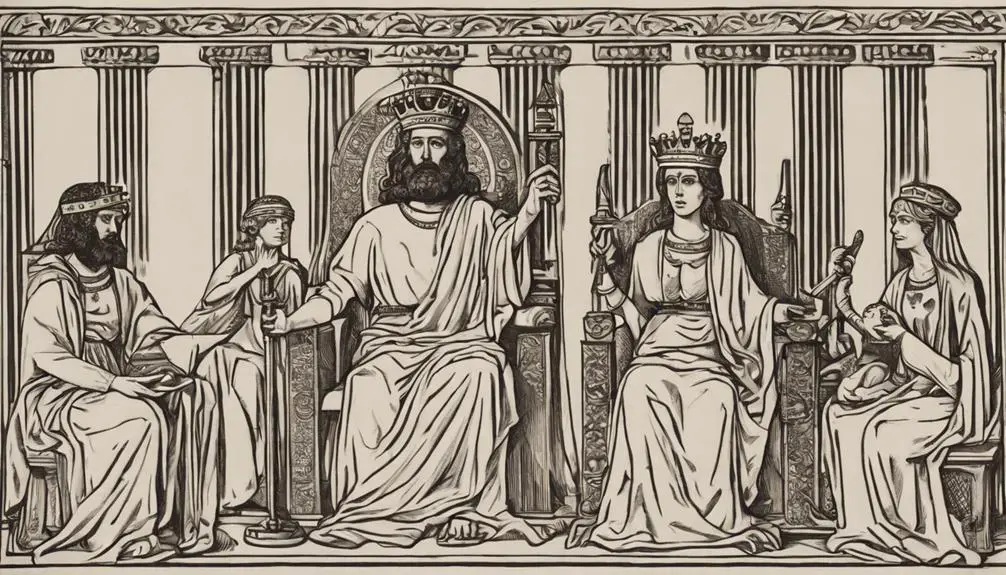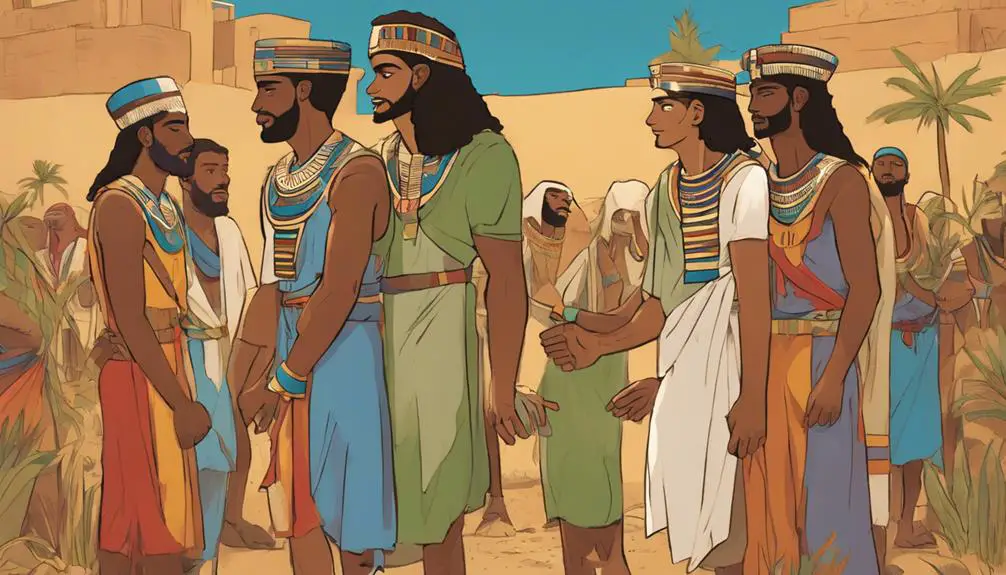Explore how biblical figures like Abraham and Solomon mastered the art of compromise, offering timeless lessons for resolving conflicts today.

Examples of Compromise in the Bible
In the grand old book of celestial negotiations, you'd hardly expect the Bible to serve as a masterclass in compromise, yet here we are. Take a moment to mull over Abraham bartering with God over Sodom like a seasoned flea market haggler, or Solomon slicing through a baby custody battle with wisdom that'd make modern judges blush.
As you explore examples like Jacob and Esau burying the hatchet, or Joseph deciding not to enact revenge on his treacherous brothers, think about how these ancient compromises might shed light on resolving conflicts in your own life. What timeless lessons could they possibly offer?
Key Takeaways
- Abraham's negotiation with God over Sodom highlights the potential for divine compromise based on righteousness.
- David's census story reveals the importance of humility and adherence to divine guidance, even in leadership decisions.
- Solomon's judgment exemplifies wisdom in leadership, showing that just solutions can emerge from discerning and strategic thinking.
- The stories of Jacob, Esau, and Joseph illustrate that reconciliation and forgiveness are possible even after significant conflict and estrangement.
Abraham's Plea for Sodom

In examining Abraham's plea for Sodom, we observe a quintessential example of compromise in biblical narratives, where Abraham negotiates with God to spare the city if righteous individuals can be found. This account underscores the potency of negotiation tactics in the face of divine intervention, showcasing a profound dialogue between a mortal and the divine. Abraham's approach is methodical, as he incrementally decreases the required number of righteous people needed to avert the city's destruction, from fifty to just ten. This strategic reduction not only highlights Abraham's negotiation skills but also illustrates the flexibility inherent in divine judgment.
The narrative emphasizes the significance of intercession on behalf of others, suggesting that divine intervention can be influenced by human reasoning and ethical considerations. Through Abraham's plea, we're invited to reflect on the dynamics of negotiation with the divine, where faith, righteousness, and persistence play pivotal roles. This story, rich in moral and theological implications, offers insight into the complexities of divine-human interaction, where compromise serves as a bridge between earthly desires and heavenly decrees. Abraham's negotiation tactics within this context reveal a nuanced understanding of justice and mercy, underscoring the possibility of altering divine plans through earnest human intervention.
Solomon's Wise Judgment

Solomon's wise judgment, often heralded as a paragon of judicial wisdom, demonstrates how discernment and insight can lead to innovative solutions in seemingly insurmountable disputes. At the heart of this narrative is a profound demonstration of divine wisdom and a mother's love, elements that are pivotal in understanding the depth of Solomon's decision-making process.
The story unfolds with two women claiming maternity over a single child, each presenting compelling arguments. Solomon's response encapsulates a masterful application of wisdom in three key aspects:
- Understanding human nature: Solomon's proposal to divide the child in two was a strategic move, not intended to be executed but to reveal the true mother's identity through her reaction.
- Prioritizing the child's welfare: The king's judgment ensured the child's safety, showcasing the value placed on innocent lives.
- Exemplifying justice: Solomon's decision restored the child to his real mother, upholding justice and demonstrating the importance of righteous leadership.
This account not only underscores the significance of divine wisdom in governance but also highlights the intrinsic value of a mother's love in discerning truth. Solomon's aptitude for judicious arbitration remains a seminal example of how wisdom can transcend conventional problem-solving, offering timeless insights into the essence of fair judgment.
Jacob and Esau's Reconciliation

Moving from the wisdom of Solomon, we now examine the tale of Jacob and Esau, a narrative steeped in conflict, estrangement, and ultimately, a profound display of forgiveness and reconciliation.
This biblical story unfolds against the backdrop of a contentious inheritance dispute, which initially drives a wedge between the two brothers, Jacob and Esau. The crux of their conflict lies in Jacob's deception of their father, Isaac, leading to Jacob receiving the blessing meant for Esau, his elder brother. This act of betrayal results in years of separation and bitterness.
However, the narrative takes a pivotal turn towards family forgiveness when Jacob and Esau eventually confront their past. Preceding their meeting, Jacob prepares for potential conflict, yet Esau's response is unexpectedly one of warmth and forgiveness. This moment is critical, illustrating the power of forgiveness over familial disputes. Their reconciliation underscores the importance of confronting past wrongs and the healing that follows genuine forgiveness.
This episode in the Bible serves as a compelling example of how family forgiveness can overcome deep-seated resentment and disputes over inheritance. It demonstrates that reconciliation, while often complex and difficult, is possible with compassion and understanding.
Joseph's Forgiveness of His Brothers

Shifting our focus to another profound biblical narrative, we encounter the story of Joseph, who, despite being sold into slavery by his brothers, chooses to forgive them in an act that epitomizes the essence of reconciliation and grace. This narrative not only sheds light on family dynamics but also underscores the power of forgiveness in overcoming adversity and healing broken relationships.
Analyzing Joseph's decision reveals three critical elements:
- Empathy: Joseph understands the fear and regret his brothers feel, reflecting his deep empathy and maturity.
- Recognition of a Greater Plan: He acknowledges that their actions, though intended for harm, were used for a greater purpose, showcasing his spiritual insight and resilience.
- Generosity: Joseph doesn't just forgive; he provides for his brothers and their families, highlighting his generosity and the transformative power of forgiveness.
These aspects collectively demonstrate how forgiveness can bridge the chasm of betrayal and hurt, leading to renewed relationships and mutual respect. Joseph's story is a timeless reminder of the strength required to forgive and the profound impact it can have on family dynamics, illustrating that true power lies not in holding onto grievances but in the capacity to forgive.
David's Census Compromise

In an intriguing episode from the Bible, King David's decision to conduct a census, despite divine disapproval, presents a complex example of compromise with significant consequences. This narrative unfolds a profound exploration of leadership humility and divine judgment, weaving a cautionary tale about the perils of disregarding spiritual guidance in favor of personal desires or societal pressures.
You observe how David, a model of leadership in many respects, grapples with his decision's fallout, demonstrating the delicate balance between sovereign authority and divine mandate. The census, ostensibly a tool for military and administrative planning, becomes a pivotal moment of compromise, leading to severe divine judgment. This judgment not only underscores the gravity of David's action but also serves as a potent reminder of the importance of humility and obedience in leadership.
The episode further elucidates the concept of divine judgment, not merely as punitive but as a mechanism for correction and restoration. David's response, marked by repentance and a plea for mercy, highlights the significance of acknowledging one's missteps and the power of humility in mitigating the consequences of compromise.
Through this lens, you're invited to reconsider the values of leadership humility and the implications of divine judgment, offering timeless lessons on the intersection of human authority and spiritual accountability.
Frequently Asked Questions
How Do Modern Theologians Reconcile the Concept of Compromise in Biblical Narratives With the Idea of Divine Infallibility?
You're exploring how theologians navigate the tension between compromise in biblical stories and divine infallibility.
They often emphasize divine flexibility, suggesting that God's interactions with humanity adapt to each context.
This theological adaptation allows for a nuanced understanding of the divine nature, aligning with the idea of an infallible deity that accommodates human limitations.
The approach is analytical, demonstrating how divine actions are consistent with both infallibility and the reality of human experience.
Are There Any Instances in the Bible Where a Compromise Is Later Viewed as a Mistake or Sin, and What Are the Consequences Outlined?
You might wonder if the Bible showcases compromises that are later deemed mistakes or sins. Indeed, it does.
King Saul's decline is a prime example, where his disobedience to God's commands reflects a compromise that leads to his downfall. Similarly, Solomon's idolatry, driven by his marriages to foreign wives, illustrates how compromise can veer into sin, with severe consequences for Israel's unity and spirituality.
Both instances underscore the perilous outcomes of such compromises.
How Has the Concept of Compromise in These Biblical Stories Influenced Legal and Ethical Norms in Contemporary Society?
You're exploring how compromise ethics, depicted in historical texts, shape societal norms today.
Compromise, a foundational concept in conflict resolution, influences legal frameworks and ethical standards in contemporary society. It teaches that finding middle ground is crucial for harmony and progress. This principle is embedded in various legal systems, encouraging negotiation and mediation over confrontation.
Thus, ancient narratives on compromise significantly impact today's legal and ethical norms, promoting a balanced and just society.
In the Context of Interfaith Dialogues, How Are the Stories of Compromise in the Bible Used to Foster Understanding and Coexistence Among Different Religions?
You'll find that in interfaith dialogues, cultural bridging and interreligious empathy are essential. These discussions often leverage shared narratives, including stories of compromise, to foster understanding and coexistence among diverse faiths.
Can the Acts of Compromise in These Biblical Stories Be Interpreted as a Form of Divine Intervention, and if So, How Does This Impact the Understanding of Free Will in These Narratives?
You're exploring whether acts of compromise can be seen as divine intervention, impacting the understanding of free will. This analysis delves into negotiation ethics and decision-making autonomy within these narratives.
If divine intervention guides compromises, it suggests a nuanced view of free will, where decisions, while seemingly autonomous, are divinely influenced. This perspective intertwines human agency with divine will, offering a complex view of autonomy and ethics in decision-making processes.
Conclusion
In analyzing these biblical narratives, it's evident that compromise plays a pivotal role in conflict resolution and relational restoration. From Abraham's negotiation with God to Solomon's discerning judgment, and from sibling reconciliations between Jacob and Esau to Joseph's forgiveness, these accounts underscore the complexity and necessity of compromise.
David's census compromise further illustrates the multifaceted nature of decision-making. Collectively, these stories offer profound insights into the dynamics of compromise within a theological and moral framework.



Sign up